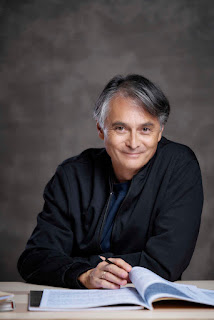ISO's Mendelssohn dramatized: A finale with all the hallmarks of a happy dream
If there were aspects of last weekend's blend of stagecraft and musical elan that approached the
 |
| ISO's artistic advisor ponders Shakespeare. |
marvelous, the concluding production in the Indianapolis Symphony Orchestra's two-part Shakespeare Festival put both a crown and a jester's cap on the Classical Series.
Following upon the romantic tragedy "Romeo and Juliet" with Prokofiev's ballet score, this time the Shakespearean vehicle is "A Midsummer Night's Dream," the comedy interweaving fairyland and social connections high and low. Mendelssohn's incidental music ties it all together in concert performance. Any presentation that comes off needs to revel in the kind of confusion and sideslipping characteristic of dream life.
The sacrifice in this case had to be any emphasis on the perils of young love, especially when family elders get in the way. Four scurrying young people, trying to master internal spats, could hardly be stuffed into a concert version within a restricted playing area and under realistic budget and time controls.
The collaboration of artistic advisor Jun Märkl and guest director Kim Martin-Cotten once again bears fruit, with the inevitable loss of dramatic material as well as much of the poetry that gives it bardic stature. As seen Friday, the suggestions of the four lovers' anxious romping in the forest at night seemed to be subsumed into the elfin movement hither and yon, mainly of Puck at the direction of Oberon, the fairy king.
Mendelssohn's score supports this, though the famous overture clearly wants to give graceful priority to the young people, especially when they fall asleep in a lovely passage just before the recapitulation. Written when he was 17, the overture shows the composer to be responsive to all aspects of the play, with the most fun being expended upon representation of the "rude mechanicals," notably the tradesman Nick Bottom's transformational sojourn as a donkey, complete with a repeated "hee-haw."
The parallel of Oberon's relationship to his queen, Titania, forged through war and now imperiled by a quarrel involving a favorite boy slave, and the similarly conflict-based liaison between Theseus, Duke of Athens, and his betrothed, Hippolyta, Queen of the Amazons, governs the action. The nuptials of the latter couple are the occasion for the most widely played section of this music, heard at countless weddings since the Victorian era. It was stunning and grandiose Friday night.
The actors, including holdovers from last week's "Romeo and Juliet," displayed a vividness and energy that made up for their necessarily truncated appearances. This was the miracle of the combination that Märkl and Martin-Cotten forged from the play and the score. Michael Goodfriend and Lisa Tejero were statuesquely paired as the fairy rulers, their costumes regal and fanciful and their gossamer wings inevitably part of their characterizations.
In startling contrast to her poignant Juliet from last week, Jessica Andrews makes for a perfectly elfin Puck. It was a treat to see local actors Scot Greenwell and Maria Argentina Souza in a few roles each, fully compatible in every appearance. H. Adam Harris was every inch a Bottom to reckon with, down to the most amazing braying capacity during the transformation scene.
The women of the Indianapolis Symphonic Choir, in a line across the rear choir loft, represented the magically tinged vocal aspect of Mendelssohn's score, completed downstage by two guest soloists, sopranos Jessica Gu and Kayla Kramer.
Before the concert, James Johnson, the orchestra's CEO, appeared onstage to pay tribute to five retiring/recently retired musicians, all string players whose terms of ISO service ranged from 37 through 51 years. The evident progressive youthfulness of the ensemble is rooted in the continuity that these veteran artists represent.
The program's first half brought back to town Sirena Huang, gold medalist in last year's International
 |
| Sirena Huang, IVCI gold medalist |
Violin Competition of Indianapolis. She proved to be another worthy quadrennial champion, with the contest pressure of the IVCI fading behind her and all of us who enjoyed the competition. This weekend she plays what's often acknowledged as the most beloved of solo violin concertos, neatly filling out the all-Mendelssohn program as a glorious curtain-raiser to the "Midsummer" music.
Her performance of the E minor concerto was poised and stately, with sufficient intensity to make the solo cadenza near the middle of the first movement the summit of her interpretation. The transition into the orchestra's re-entry was handled superbly from the podium. The well-knit performance of the second movement yielded to a painstaking, though anything but painful, launch of the finale.
Huang's slight smile toward Märkl during this episode looked entirely natural, an expression of genuine delight in her task. She brought all of it off with sparkling tone and articulation, matched smoothly to the accompaniment. With sustained shouts from the audience eliciting an encore, she turned to her heritage, playing a character piece, "Entranced by Mountain Scenery" by Shangquian Li. It was a picture of balm at the heights, with a touch of revelry in solitude, fueled by a little drink or two (as the violinist informed the audience in advance from the stage).
Unintentionally, the beguiling scene Huang evoked was prophetic of the balm that descends over all the lively goings-on in "A Midsummer Night's Dream" when Puck delivers the final speech, a plea for forgiveness and acceptance that has always moved me, as it did once again Friday as delivered by Jessica Andrews.



Comments
Post a Comment